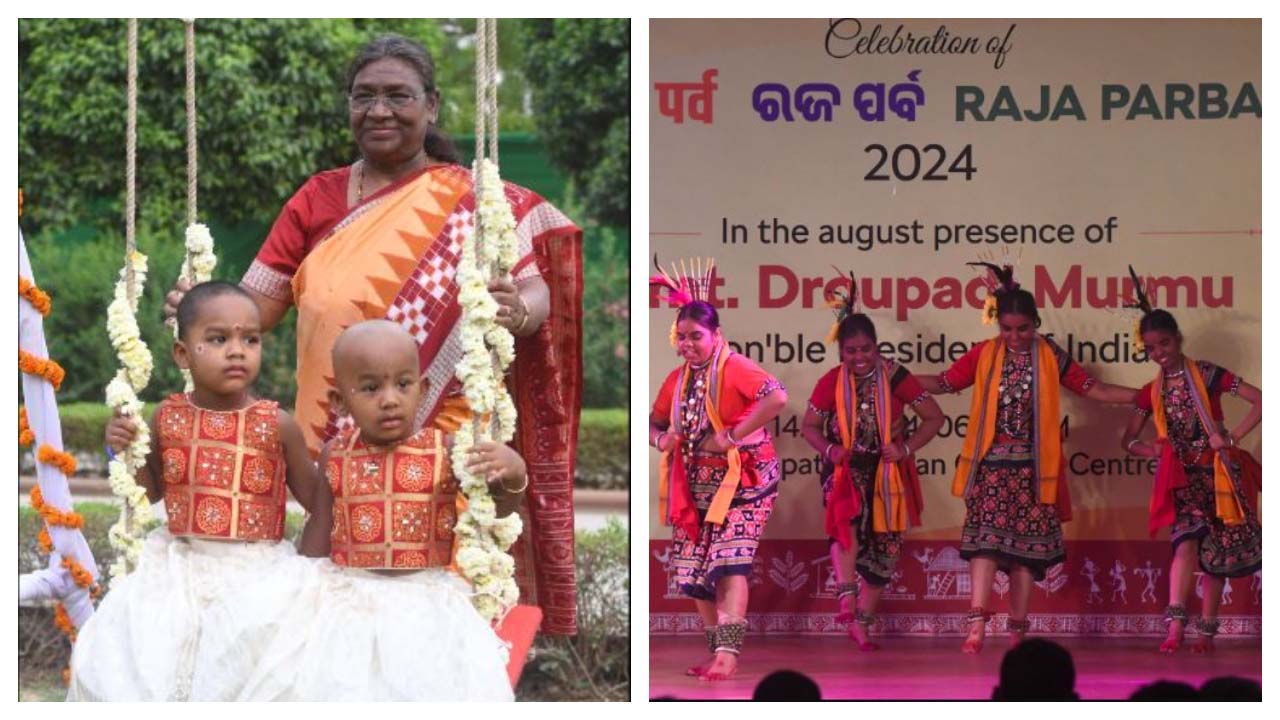President Droupadi Murmu graced the Rashtrapati Bhavan on Friday to partake in the ‘Raja Parb’ festivities of Odisha, immersing herself in the state’s rich cultural tapestry through performances like ‘Mayurbhanj Chhau,’ ‘Sambalpuri,’ and ‘Karma’ dances.
The ‘Raja Parb’ stands as a significant celebration in Odisha’s cultural calendar. This three-day agrarian festival heralds the monsoon season, celebrated with immense zeal and enthusiasm. The festivities are marked by swings adorned with flowers and mango leaves, serving as the festival’s central attraction.
Mehndi artists were on hand, and a spread of Odia culinary delights, including various ‘pithas’ along with ‘sherbet’ and ‘paan,’ were offered to the attendees, as per a communiqué from the President’s Secretariat. The Rashtrapati Bhavan’s official X account shared, “President Droupadi Murmu attended the Raja Parb celebrations, an agricultural festival of Odisha, at Rashtrapati Bhavan. She also enjoyed a cultural program featuring Raja Geet and performances of Mayurbhanj Chhau, Sambalpuri, and Karma dances.”
Significantly, President Murmu, hailing from Odisha’s tribal community, witnessed the first-ever celebration of this agrarian festival at the Rashtrapati Bhavan. This event offered a unique window into Odia culture and lifestyle for the participants. Concurrently, the BJP Odisha’s official X account posted about state Chief Minister Mohan Charan Majhi’s participation in the festivities.
The post stated, “On the inaugural day of Odisha’s Ganparb Raj, Chief Minister Mohan Majhi participated in the Raj Parb celebrations at the state museum in Bhubaneswar, where he watered the trees and engaged children in swinging.” Furthermore, BJP MP from Puri, Sambit Patra, inaugurated the Raja Mahotsav at the Odisha Tourism Development Corporation (OTDC) in Khordha.
The festival is steeped in the belief that Mother Earth, regarded as the divine consort of Lord Vishnu, experiences menstruation during the initial three days. The fourth day, termed Vasumati Gadhua, signifies the ceremonial ablution of Bhudevi. The word ‘Raja’ is derived from ‘Rajaswala’ (a menstruating woman), and during the medieval era, the festival evolved into an agrarian holiday venerating ‘Bhudevi,’ the consort of Lord Jagannath.
A silver effigy of Bhudevi is still present in the Puri Temple, alongside Lord Jagannath. During the celebrations, young women don new attire, indulge in ‘Doli Jhula,’ and relish traditional delicacies such as ‘Podo P









